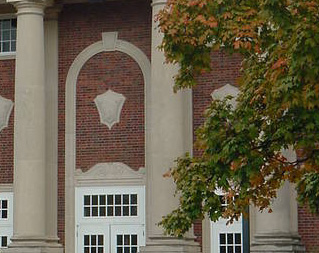
NARSC Graduate Student Paper Competitions The North American Regional Science Council (NARSC) Graduate Student Paper Competitions are held annually in conjunction with the North American Meetings of the Regional Science Association International (RSAI). These contests encourage the participation of young scholars by providing a forum for paper presentation and discussion by senior scholars in the field of regional science. Beginning in 2010, two separate competitions have been held for graduate student papers:
- Graduate-Student-Author Paper Competition: Eligibility for the award is limited to current Masters and PhD students, and/or recent graduates who completed their degree after August 1, 2023. Co-authored papers are acceptable; however, all authors listed on a paper must meet the eligibility criteria above.
- Graduate-Student-Led Paper Competition: Eligibility for the award requires that the paper’s “primary author” be a current Masters or PhD student, or a recent graduate who completed their degree after August 1, 2023. Papers with senior co-authors are acceptable; however, most of the substantive work and contribution of the paper must be directly attributable to an author who meets the eligibility criteria above.
The 2024 contest will be held in conjunction with the annual North American Meetings of the Regional Science Association International, to be held November 13 – 16, 2024 in New Orleans, LA.
Acceptance of the paper for full consideration requires the following:
- Individuals must submit an abstract for the paper through the NARSC abstract submission page AND the relevant box should be ticked indicating the paper is being submitted as part of the student paper competition.
- Individuals should submit a digital copy of their paper to the appropriate competition chair, formatted using the Papers in Regional Science guidelines
- A cover letter from their academic advisor confirming the author(s) meet all necessary eligibility requirements for the competition selected.
For the Graduate-Student-Author Paper Competition, the cover letter should state that the graduate student(s) meets the eligibility criteria. In addition, the advisor should confirm that they will not be included in the authorship should the paper be published.
For the Graduate-Student-Led Paper Competition, the cover letter should state the approximate percentages of the substantive work (ideas, methods, and applications) and contributions that are directly attributable to the primary author (the student or recent graduate). In addition, the cover letter should state that the graduate student meets the eligibility criteria; and the advisor should agree to have the student remain as the first author should the paper be published.
- Papers must be presented in-person at the annual North American Meetings of RSAI by the student author(s).
Deadlines:
- Abstracts are due on July 12, 2024.
- The full paper and accompanying academic advisor’s cover letter are due on August 31, 2024.
Both the full paper, formatted using the Papers in Regional Science guidelines and the advisor’s cover letter should be submitted in electronic format to:
- Graduate Student-Author Paper Competition: Chair: Christa Court, University of Florida Email: ccourt@ufl.edu
- Graduate Student-Led Paper Competition: Chair: Claudia Montanía Portillo, University of Arizona Email: cvmontania@arizona.edu
For each of the competitions, up to four finalists will be selected from all the submissions. Each finalist will present their papers in-person during a special session (one or two sessions, depending on number of finalists) at the annual North American Meetings of RSAI. All finalists should plan to attend the Awards Luncheon held on Saturday, November 16, 2024.
Since the competition’s inception in 2006, first prize in the NARSC Graduate Student Paper Competition has been awarded to the following students:
- 2006 Thomas Light (Cornell University) and Steven Poelhekke (European University Institute)
- 2007 Amaya Vega (University College Dublin)
- 2008 Stephen Billings (University of North Carolina at Charlotte)
- 2009 Felix Weinhardt (London School of Economics)
- 2010 Beatrix Brügger and Raphaël Parchet (University of Lausanne)
- 2011 Nathan Yang (University of Toronto)
- 2012 Samuel Glendening Krueger (University of Southern California)
- 2013 Michael Suher (Brown University)
- 2014 Tate Twinam (University of Pittsburgh)
- 2015 Heitor Pellegrina (Brown University)
- 2016 Dhari Aljutaili (University of California Irvine)
- 2017 Robert Manduca (Harvard University)
- 2018 Luke Petach (Colorado State University)
- 2019 Tidiane Ly, GATE (Lyone Saint-Etienee)
- 2020 Ben Blemings (West Virginia University)
- 2021 Pedro Herrera Catalan (Universidad Autónoma de Madrid)
- 2022 Guanting Yi (The Ohio State University)
- 2023 Evan Cunningham (University of Minnesota – Twin Cities)
First Prize in the NARSC Student-Led Graduate Student Paper Competition has been awarded to the following participants:
- 2010 Jean Dubé (Université du Québec) and co-author Diego Legrosy (Université de Bourgogne)
- 2011 Sergeis Gubins and co-author Erik T. Verhoef (Free University of Amsterdam)
- 2012 Wendong Zhang and co-authors Douglas Wrenn and Elena G. Irwin (Ohio State University)
- 2013 Wendong Zhang and co-author Cynthia Nickerson (Ohio State University)
- 2014 Sungyup Chung and co-author Geoffrey Hewings (University of Illinois at Urbana-Champaign)
- 2015 Joep Steegmans and co-author Wolter Hassink (Utrecht University)
- 2016 Leonardo Bonilla and Esteban Lopez and co-author Dan McMillen (University of Illinois at Urbana-Champaign)
- 2017 Nicola Cortinovis (Erasmus University Rotterdam)
- 2018 Paul Jung and co-author Jean Claude Thill (University of North Carolina at Charlotte)
- 2019 Oudom Hean and co-author Mark Partridge (The Ohio State University)
- 2020 Lucas Dias; co-authors Eduardo Haddad & Andres Maggi (University of São Paulo) Neils Kuiper; co-authors Mark van Duijn & Arno van der Vlist; (University of Groningen); Tianren Yang; co-author Ying Jin (University of Cambridge)
- 2021 Paul Jung (University of North Carolina at Charlotte) and co-authors Jean-Claude Thill (University of North Carolina – Charlotte) and Luis Armando Galvis-Aponte (Banco de la Republica, Columbia)
- 2022 Sowon Kim (The Ohio State University)
- 2023 Junliang Chen (Renmin University of China)
